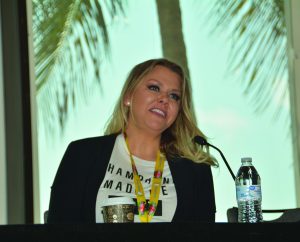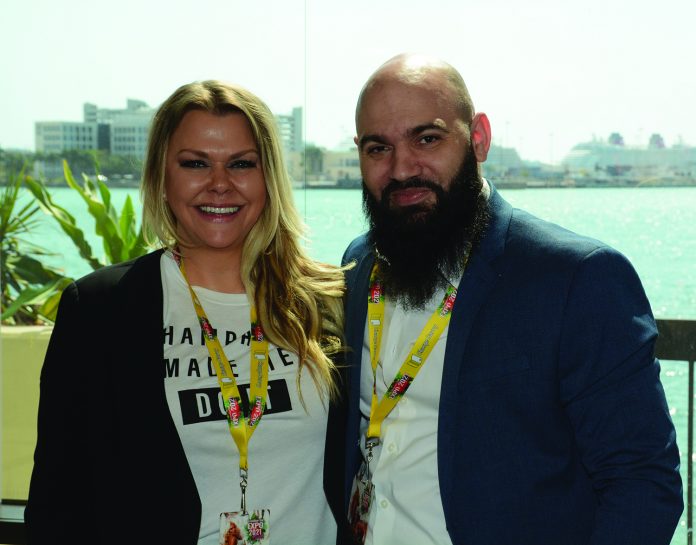(Note: This story appears in the July 2021 issue of ED Magazine)
Pandemic or no, becoming profitable as quickly as possible is certainly a priority. Whether it’s liquor bottle sales or other forms of “upselling,” food specials, or in-club promotions, the “Rebound” panel educated attendees on maximizing per-guest revenue.
It was $25 champagne kickers that kick-started Lisa Hinds on her path to becoming a senior manager for Scores Chicago O’Hare. In the late ‘90s at Thee Dollhouse, a manager came up to Hinds, then a bartender, offering $25 bonuses for every champagne bottle. Hinds witnessed first-hand the financial blessing of bubbly as higher bar tabs translated to higher tips.
“Then I realized, the faster I can get rid of a bottle, the quicker I can sell another one,” Hinds said at EXPO 2021’s “Rebound” seminar designed to illuminate the mysteries surrounding upselling. “I learned that involving everybody and being inclusive and bringing everybody into the party made everybody happy. It made the club more money, it made the entertainers more money, it made me more money. And that was fun. It’s not a game, but it was a mission I was on every day.”
Hinds was hooked.
“Whether that tab is $5 higher or $10,000 higher, I did my job,” she added. “That tab was the most that it was going to be because I was there.”
If there was one thing that attracted Hinds and fellow panel speaker Ray Santiago — now GM of Rick’s Cabaret in San Antonio — it was money. That isn’t to say Santiago was blinded by it, in fact, quite the opposite. He explained how as he came up, he observed and learned how “upselling isn’t just pushing bottles. It’s an art form, understanding how to read a customer and not just look at them as a dollar sign, but really look at them and understand what they’re looking to do at your establishment, get the best product for whatever they’re there for. I got consumed with the idea of learning that.”
Both Hinds and Santiago also remarked how it didn’t take them long to realize upselling is as much a team effort as it is an individual one.
“You want to make sure that what you’re promoting and what you’re pushing grabs not only your team, but the client as well,” said Santiago.
Few things spread like excitement.
Hinds recalled when Thee Dollhouse had a cigar etiquette class when cigar smoking among women was trendier.
 “And now here’s something else I could sell, that I never in my life thought I would be selling cigars,” she said. “But after I took that class, I thought it was so cool that I now knew how to do this. So then, as soon as the guests walk in, this wasn’t even about money anymore. I was like, ‘Whoa, want to see what I can do? I can smoke a cigar, I can cut it, I can light it, I know how to twist it the right way—and guess what? We sold a ton of cigars. The more people know about a product, the easier it is for them to sell.”
“And now here’s something else I could sell, that I never in my life thought I would be selling cigars,” she said. “But after I took that class, I thought it was so cool that I now knew how to do this. So then, as soon as the guests walk in, this wasn’t even about money anymore. I was like, ‘Whoa, want to see what I can do? I can smoke a cigar, I can cut it, I can light it, I know how to twist it the right way—and guess what? We sold a ton of cigars. The more people know about a product, the easier it is for them to sell.”
“Literally any product that you want to push, you can do it. You just have to create that excitement,” Hinds added.
Consistency is also a key component of the upsell.
“Anything can be upsold,” said Santiago, noting that when you or a staff member close the deal on a bottle upsell, that’s not the end of the night. “Your hospitality doesn’t stop when the bottle gets delivered. The hospitality across the board has to be on point. You have to be consistent because that’s what they’re paying for. They’re paying for the experience.”
“Upselling isn’t just pushing bottles. It’s an art form, understanding how to read a customer and not just look at them as a dollar sign, but really look at them and understand what they’re looking to do at your establishment, get the best product for whatever they’re there for. I got consumed with the idea of learning that.” — Ray Santiago
Upselling, from A to Gen-Z
A common trend, worldwide really, amid the early loosening of COVID restrictions has been younger people returning to their roles as consumers earlier than their older counterparts.
“It seemed as if the 20-something-year-old kids felt safer, they don’t feel like they’re at risk or less at risk for COVID, so it makes sense that clubs were telling us they were seeing a younger clientele as their older clientele was a little hesitant to walk back in,” commented ED Associate Publisher Dave Manack, who served as the panel’s moderator.
Manack’s question for the paneliests was, is upselling to a 20-something-year-old the same as upselling to a 45-year-old? While it’s important to uphold the tenets of conjuring up excitement and maintaining consistency, as far as upselling — it’s hard to argue different strokes for different-aged folks.
 “The biggest change I’ve seen is (younger customers) they know what they want, they want the cheapest price for it, they just want the wow factor,” said Santiago, who added it doesn’t change how they operate. “We keep it as consistent as possible because eventually those 20-somethings are going to be 30-somethings. You show them from the start what you’re doing. We don’t miss a beat.”
“The biggest change I’ve seen is (younger customers) they know what they want, they want the cheapest price for it, they just want the wow factor,” said Santiago, who added it doesn’t change how they operate. “We keep it as consistent as possible because eventually those 20-somethings are going to be 30-somethings. You show them from the start what you’re doing. We don’t miss a beat.”
Hinds didn’t mind admitting upselling to millennials and Gen-Zers is different from what she’s used to, pushed her out of her comfort zone.
“It made me think outside the box,” she said, noting how her club had an 80/20 marketing strategy where the 80% corresponded to the typical cabaret crowd. The other 20% was younger kids to fill up seats. “Now, flip it. Over the last year, we had 20% cabaret guests because our target guest was not comfortable coming out at the time and these kids are. You have to be able to look at whatever the scenario is.”
“I learned that involving everybody and being inclusive and bringing everybody into the party made everybody happy. It made the club more money, it made the entertainers more money, it made me more money. And that was fun. it’s not a game, but it was a mission i was on every day.” — Lisa Hinds
That could mean pairing a particular staff member with a guest on a hunch and making sure no team member takes it personally.
“Sales is not about ego,” she said to a round of applause from the audience. “If you have an ego, you’re not going to be really good at selling, I promise you. When you put the right host, the right server, the right entertainer on a guest, you will maximize your profits, because now your guest is happy.”
One way to visualize per-guest value is to divvy up your sales-goal numbers by how many seats are available, as many clubs have had to pare down seating to observe social distance requirements. That doesn’t necessarily mean all seats are equal, as a seat on a Tuesday night at 8 pm probably isn’t as valuable as a four-top on a Friday night at midnight. Hinds said it wasn’t set in stone here’s what any given seat is worth and when.
“As a manager, I’m going ‘What would I like our numbers to be tonight? Now divide that by 50 (seats) and there’s your answer,” Hinds said. “I’ll go back to what I said earlier, upselling to me is making that experience the best that it can be. I know that if I am there and I have made that sale, that the experience, the entire thing, will be at its best.”





























